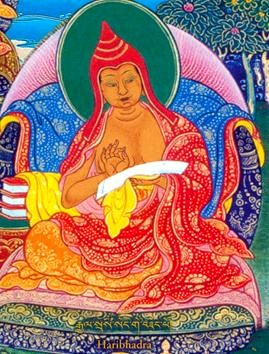Sphutartha: Difference between revisions
Jump to navigation
Jump to search
No edit summary |
No edit summary |
||
| Line 6: | Line 6: | ||
*[[Serlingpa]], ''Light on the Difficult-to-Comprehend'' | *[[Serlingpa]], ''Light on the Difficult-to-Comprehend'' | ||
*[[Prajñakaramati]], ''Essential Meaning'' | *[[Prajñakaramati]], ''Essential Meaning'' | ||
===Tibetan=== | |||
*[[Yaktön Sangye Pal]], ''Yak-tik'' | |||
*[[Khenpo Shenga]], ''Shenpen Nangwa'' | |||
==Further Reading== | |||
*David P. Jackson, ed., ''Rong-ston on the Prajñāpāramitā Philosophy of the Abhisamayālaṃkāra, His Sub-commentary on Haribhadra's "Sphuṭārthā": A Facsimile Reproduction of the Earliest Known Blockprint Edition, from an Exemplar Preserved in the Tibet House'', New Delhi, Nagata Bunshodo (Kyoto 1988) | |||
[[Category:Texts]] | [[Category:Texts]] | ||
[[Category:Abhisamayalankara]] | [[Category:Abhisamayalankara]] | ||
[[Category:Prajnaparamita]] | [[Category:Prajnaparamita]] | ||
Revision as of 09:47, 12 November 2010

Clear Meaning Commentary (Skt. Sphuṭārthā; Wyl. 'grel pa don gsal) by Haribhadra, the most celebrated commentary on Maitreya's Abhisamayalankara. The actual title is 'Commentary on the Abhisamayalankara, the Shastra of Instructions on the Prajnaparamita' (Skt. Abhisamayālaṅkāra-nāma-prajñāpāramitopadeśaśāstravṛtti; Wyl. shes rab kyi pha rol tu phyin pa'i man ngag gi bstan bcos mngon par rtogs pa'i rgyan zhes bya ba'i 'grel pa), but it is commonly known as the Sphutartha (literally 'blossomed or burst open meaning').
Commentaries
Indian
- Dharmamitra, Explanatory Commentary Clarifying the Words
- Serlingpa, Light on the Difficult-to-Comprehend
- Prajñakaramati, Essential Meaning
Tibetan
- Yaktön Sangye Pal, Yak-tik
- Khenpo Shenga, Shenpen Nangwa
Further Reading
- David P. Jackson, ed., Rong-ston on the Prajñāpāramitā Philosophy of the Abhisamayālaṃkāra, His Sub-commentary on Haribhadra's "Sphuṭārthā": A Facsimile Reproduction of the Earliest Known Blockprint Edition, from an Exemplar Preserved in the Tibet House, New Delhi, Nagata Bunshodo (Kyoto 1988)